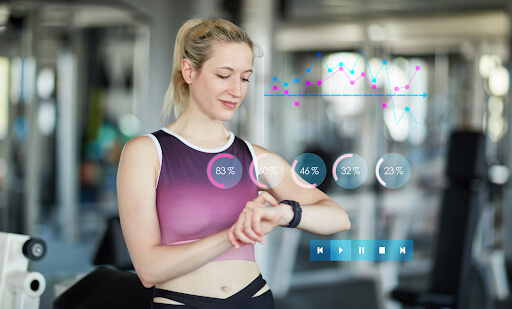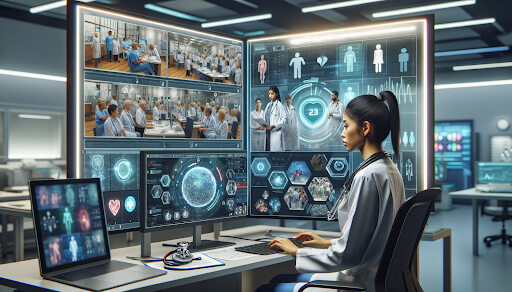 1-800-805-5783
1-800-805-5783 
Digital healthcare technology has fundamentally transformed the landscape of clinical trials, fostering a more patient-centered approach by enabling real-world data collection outside the traditional clinical setting. This shift, characterized by a significant increase in the utilization of digital health technologies (DHTs) such as wearables for personal data collection at home, has seen the relative frequency of clinical trials employing DHTs soar from 0.7% in 2010 to an impressive 11.4% by 2020. Moreover, the advent of digital technology has streamlined the execution of decentralized and hybrid clinical trials on a global scale, marking a pivotal evolution in the field.
Integrating technology in clinical trials, from artificial intelligence in diagnostic devices to leveraging real-world data for study recruitment, introduces several advantages. These include heightened transparency, augmented collaboration, and reduced burdens on patients and study sites, which are pivotal for large-scale, international studies. Furthermore, healthcare technology innovations align with the principle of patient focus, significantly enhancing efficiency and productivity within clinical trials. With an eye on the future, this article discusses the role of wearable devices, telemedicine, remote monitoring, AI, and big data analytics, framing a comprehensive view of how digital healthcare technology redefines clinical trials.
The COVID-19 pandemic has undeniably served as a catalyst for healthcare technology and innovation within clinical research, particularly highlighting the successful implementation and uptake of decentralized and hybrid clinical trials globally. This significant shift towards digitalization has enabled clinical trials to be conducted virtually, eliminating the need for in-person interactions. The advancements in digital healthcare technology, including the integration of synthetic biology, virtual reality, and the Internet of Things, are poised to disrupt the traditional drug development enterprise, offering a glimpse into the future of clinical trials.
Innovations and Their Impact:
Integrating digital technologies into clinical trials over the past five years has not only improved the design and implementation of these studies but has also addressed several longstanding challenges. Mobile communications and wearable technology advancements have played a pivotal role in enhancing patient recruitment, especially in underserved communities, and in automating data monitoring to collect a wealth of data efficiently. Central data hubs facilitate data accessibility across multiple locations, significantly improving the analysis of big data and the overall patient experience.

Challenges and Solutions:
This healthcare technology evolution underscores the sector’s gradual yet increasing demand for breakthroughs, driven by rising costs, higher rates of trial failures, and a shift towards patient-centric trials. The integration of wearable technology, AI, big data analytics, synthetic biology, telemedicine, and mobile apps is not only fostering faster recruitment and better participant retention but is also paving the way for a more patient-centric approach through remote patient monitoring and decentralization of trials.
Wearable devices such as smartwatches and fitness trackers have revolutionized the landscape of healthcare technology and clinical trials, offering seamless integration into participants’ daily lives while providing invaluable data. The widespread adoption of these devices has been driven by their ability to measure physiological changes in real-time, including: accurately
This real-time monitoring allows for continuous observation of a patient’s health status, enabling prompt intervention should potential problems arise. Moreover, the objective data harvested from wearables have proven to be good indicators of depression and other psychiatric conditions, showcasing the broad potential of these devices in the realm of mental health.

The challenges associated with wearable devices in clinical trials primarily revolve around data management. The sheer volume of data generated necessitates advanced analytical frameworks to differentiate meaningful signals from noise. Despite these challenges, the integration of wearable medical technology and telehealth holds vast potential for the future of healthcare technology and clinical trials. Key advantages include:
The role of wearable devices in clinical trials extends beyond data collection, fundamentally changing the design and execution of studies. They offer researchers a real-world view of a patient’s response to treatment, facilitate earlier decision-making through access to near-continuous real-time data, and allow for more accurate intervention triggers. Furthermore, wearable devices can significantly improve subject retention by delivering prompts and sharing information to encourage active participation. This reduces the costs associated with clinic visits and enhances the effectiveness of trials through lower clinical site time and personnel needs.
In summary, wearable devices in clinical trials and healthcare technology represent a paradigm shift towards more patient-centric, efficient, and effective research methodologies. They enable:
As the digital age continues to unfold, the integration of wearable devices in clinical trials will undoubtedly play a pivotal role in shaping the future of healthcare research, offering promising avenues for innovation and improved patient outcomes.
Telemedicine and mobile communications have significantly expanded the reach and inclusivity of clinical trials and healthcare technology, introducing a patient-centric model that leverages digital healthcare technology for comprehensive remote monitoring and efficient data collection. The integration of medical technologies facilitates real-time physiological monitoring and direct communication between patients and healthcare providers, transforming clinical trials into more accessible and engaging experiences for participants across the globe. The following key points underscore this shift towards hybrid or decentralized trials powered by healthcare technology:
The advent of the COVID-19 pandemic has spotlighted remote monitoring as a critical component of clinical trials and an integral part of healthcare technology, driving innovation in remote site access and monitoring tools. These advancements reduce the operational costs of clinical trials and enhance their efficiency and effectiveness by providing a more thorough understanding of patient reactions and conditions. A study conducted at the Bégin Military Teaching Hospital highlighted the effectiveness of telemonitoring platforms, reporting high levels of patient compliance (76%) and satisfaction (95%). However, it also noted that telemedicine cannot completely replace the need for in-person care, as evidenced by unscheduled hospitalizations during the study period.

Remote monitoring tools offer several advantages, including:
Integrating telemedicine and remote monitoring in clinical trials represents a pivotal shift towards more innovative, efficient, and patient-centric research methodologies. By leveraging digital healthcare technology, clinical trials can achieve greater inclusivity, enhance participant engagement, and improve research outcomes’ overall quality and reliability.
In the rapidly evolving landscape of clinical trials, AI and big data analytics are playing a transformative role, streamlining processes and enhancing the efficiency of research and development. Integrating these advancements is not just an innovation but a necessity, addressing critical challenges and unlocking new opportunities in the realm of healthcare technology.
Also Read: Precision Medicine: How Big Data and Genomics are Revolutionizing Treatment?
AI’s Role in Clinical Trials:
Big Data Analytics in Clinical Trials:
The Future of Clinical Trials with AI and ML:
The integration of AI and big data analytics into clinical trials signifies a monumental shift towards more efficient, patient-centered, and innovative research methodologies. By leveraging these technologies, the future of clinical trials promises accelerated medical breakthroughs, reduced costs, and a more profound understanding of diseases and treatments. As the digital age advances, the seamless synergy of AI, machine learning, and big data analytics will continue to redefine the boundaries of what is possible in clinical research, setting new benchmarks for efficiency, effectiveness, and patient-centricity in the process.
Also Read: Robotics in Healthcare.

Navigating the complex landscape of digital healthcare technology in clinical trials involves addressing multifaceted challenges while embracing future perspectives to enhance research methodologies and patient outcomes. The integration of advanced technologies raises both opportunities and obstacles that require strategic solutions and innovative approaches.
Challenges in Implementing Digital Healthcare Technology:
Strategies for Overcoming Challenges:
Future Perspectives in Clinical Trials:
By addressing the challenges head-on and leveraging the potential of digital healthcare technology, the future of clinical trials looks promising, with the potential to transform patient care and accelerate medical breakthroughs.
Throughout this article, we’ve witnessed how digital healthcare technology is revolutionizing the field of clinical trials, from enhancing patient participation with wearable devices to leveraging AI and big data for more efficient trial processes. The significant shift towards digitalization, emphasized by the declining traditional face-to-face clinical settings in favor of decentralized and hybrid models, underscores a transformative era in clinical research. This evolution not only addresses the historical challenges of engagement and data collection but also opens up a more inclusive and comprehensive approach to patient care and medical discovery.
Looking ahead, the persistent integration of innovative technologies in clinical trials signals a promising horizon for both research methodologies and patient outcomes. Embracing the digital age, the clinical trial landscape is set to become more patient-centric, efficient, and effective, facilitating a bridge between pioneering research and real-world healthcare applications. As we continue to navigate the complexities and potentials of digital healthcare technology, the commitment to improving patient experiences and outcomes remains paramount, heralding a new epoch of medical research and development.
What effects does digital healthcare technology have on patient care?
Digital healthcare technology grants patients access to their health information, including medical records, test results, and tools for managing their own health. This empowers patients to actively participate in making informed decisions about their care in collaboration with their healthcare providers.
How do clinical trials contribute to advancements in medical technology?
Clinical trials play a crucial role in the discovery of new treatments for diseases and in the development of novel methods for detection, diagnosis, and prevention. They provide researchers with essential information about what is effective in humans, which cannot be obtained through laboratory experiments or animal studies.
In what ways has digital technology transformed healthcare?
Digital technology has revolutionized healthcare by speeding up communication and facilitating the transition from paper to electronic medical records. This shift has streamlined record-keeping and made it easier for patients to transfer their medical information when changing healthcare providers.
What are the recent technological innovations in conducting clinical trials?
Recent technological innovations in clinical trials include the adoption of telemedicine, remote patient monitoring, and electronic consent. These technologies enable patients to participate in clinical trials from their homes, reducing the necessity for frequent visits to the trial sites and enhancing overall convenience.